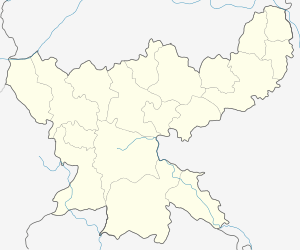Karmatanr (community development block)
| Karmatanr Karmatar Vidysagar | |
|---|---|
| Community development block | |
 Karmatanr  Karmatanr Location in Jharkhand, India 24°5'2"N 86°42'8"E | |
| Coordinates: 24°5′2″N 86°42′8″E / 24.08389°N 86.70222°ECoordinates: 24°5′2″N 86°42′8″E / 24.08389°N 86.70222°E | |
| Country |
|
| State | Jharkhand |
| District | Jamtara |
| Government | |
| • Type | Community development block |
| Elevation | 201 m (659 ft) |
| Population (2011) | |
| • Total | 115,266 |
| Languages | |
| • Official | Hindi, Santali |
| Literacy (2011) | |
| • Total literates | 53,844 (58.16%) |
| Time zone | IST (UTC+5:30) |
| PIN | 815352 (Karmatar) |
| Telephone/STD code | 06433 |
| Vehicle registration | JH 21 |
| Lok Sabha constituency | Dumka |
| Vidhan Sabha constituency | Jamtara and Sarath |
| Website |
jamtara |
| CD Block | |
Karmatanr is a community development block that forms an administrative division in Jamtara district, Jharkhand state, India. It is located 15 km from Jamtara, the district headquarters.
Geography
Karmatar is located at 24°5′2″N 86°42′8″E / 24.08389°N 86.70222°E.[1]
Karmatanr CD Block has 18 panchayats and 151 villages.[2]
Panchayats of Karmatanr CD Block are: Alagchuan, Bagber, Baradaha, Barmundi, Birajpur, Dumariya, Karmatanr, Kuruwa, Mattanr, Mohanpur, Nawadih, Phofnad, Sikarposni, Sitakatta, Subdidih, Tarabahal, Tarkojori and Tetulbandha.[2]
History
Ishwar Chandra Vidyasagar, the scholar-social reformer and a key figure in the Bengal Renaissance came to Karmatar in 1873 and spent more than 18 years of his life here.[3] In 1974, the railway station at Karmatar was renamed Vidyasagar.[4]
Demographics
As per 2011 Census of India Karmatar CD Block (mentioned in 2011 census as Karmatar Vidyasagar) had a total population of 115,266, of which 109,398 were rural and 5,868 were urban. There were 58,937 (51 %) males and 56,329 (49 %) females. Scheduled Castes numbered 7,737 and Scheduled Tribes numbered 21,767. Population below 6 yrs was 22,693.[5]
Karmatar (2011 population 5,868) is a census town in this block.[5]
Literacy
As per 2011 census CD Block Wise Primary Census Abstract Data the total number of literates in Karmatar Vidyasagr CD Block was 53,844 (58,16 % of the population over 6 years) out of which 33,798 (63 %) were males and 20,046 (37 %) were females.[5]
As per 2011 census Primary Census Abstract Tables Jamtara district had a population of above 6 years of 660,049 and the total number of literates in the district were 426,312 (64.59 % of the population over 6 years). [6] According to District Census 2011, literacy in Jamtara district was 64.59.[7]Literacy in Jharkhand (for population over 7 years) was 66.41% in 2011. [8]Literacy in India in 2011 was 74.04%.[9]
| Literacy in CD Blocks of Jamtara district |
|---|
| Narayanpur – 55.72% |
| Karmatanr – 58.16% |
| Jamtara – 66.31% |
| Nala – 64.63% |
| Fatehpur – 65.66% |
| Kundhit – 63.64% |
| Source: 2011 Census: CD Block Wise Primary Census Abstract Data |
Transportation
The Ranigunj-Kiul section of the Howrah-Delhi main line was in position in 1871. It provided rail link for Karmatar.[10]
References
- ↑ "Karmatar (Karmatar)". Jharkhand. Wikimapia. Retrieved 26 December 2015.
- 1 2 "Jamtara district of Jharkhand". Blocks and Panchayats. Jamtara district administration. Retrieved 26 December 2015.
- ↑ "Vidyasagar legacy lost in sands of time". The Telegraph, 26 August 2003. Retrieved 26 December 2015.
- ↑ Hatcher, Brian A. "Vidyasagar:The Life and After-life of an Eminent Indian". Introduction. Routledge, Taylor and Francis Group, 912 Tolstoy House, 15-17 Tolstoy Marg, Connaught Place, New Delhi- 110 001. ISBN 978-0-415-73630-5. Retrieved 26 December 2015.
- 1 2 3 "2011 Census C.D. Block Wise Primary Census Abstract Data(PCA)". Jharkhand – District-wise CD Blocks. Registrar General and Census Commissioner, India. Retrieved 26 December 2015.
- ↑ "2011 Census – Primary Census Abstract Data Tables". Jharkhand – District-wise. Registrar General and Census Commissioner, India. Retrieved 27 December 2015.
- ↑ "District Census 2011". District Census Details, Sr. No. 486, lot no. 49. Population Census 2011. Retrieved 27 December 2015.
- ↑ "Jharkhand Profile" (PDF). Census Info India 2011 – Final population totals. Census Commissioner, Government of India. Retrieved 27 December 2015.
- ↑ "Literacy in India". Census 2011. Census population 2015 data. Retrieved 27 December 2015.
- ↑ "IR History: Early days II". Chronology of Railways in India, Part 2, 1870-1899. IRFCA. Retrieved 26 December 2015.